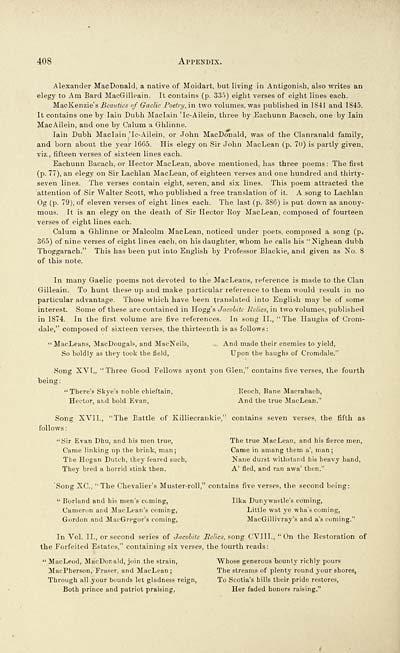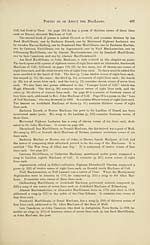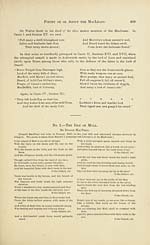History of the Clan MacLean from its first settlement at Duard Castle, in the Isle of Mull, to the present period
(414) Page 408
Download files
Complete book:
Individual page:
Thumbnail gallery: Grid view | List view

408 Appendix.
Alexander Mac Donald, a native of Moidart, but living in Antigonish, also writes an
elegy to Am Bard MacGilleain. It contains (p. 33t) eight verses of eight lines each.
MacKenzie's Beauties nf Gaelic Poetry, in two volumes, was published in 1841 and 1845.
It contains one by Iain Dubh Maclain 'Ic-Ailein, three by Eachunn Bacach, one by Iain
MacAilein, and one by Calum a Ghlinne.
Jain Dubh Maclain 'Ic-Ailein, or John MacDonald, was of the Clanranald family,
and born about the year 1665, His elegy on Sir John MacLean (p. 7ti) is partly given,
viz., fifteen verses of sixte(en lines each.
Eachunn Bacach, or Hector MacLean, above mentioned, has three poems: The first
(p. 77), an elegy on Sir Lachlan MacLean, of eighteen verses and one hundred and thirty-
seven lines. The verses contain eiglit, seven, and six lines. This poem attracted the
attention of Sir Walter Scott, who published a free tran.slation of it. A song to Lachlan
Og (p. 79), of eleven verses of eight lines each. The last (p. 386) is put down as anony-
mous. It is an elegy on the death of Sir Hector Roy MacLean, composed of fourteen
verses of eight lines each.
Calum a Ghlinne or Malcolm MacLean, noticed under poets, composed a song (p.
365) of nine verses of eight lines each, on his daughter, whom he calls his " J> ighean dubh
Thoggarach." This has been put into English by Professor Blackie, and given as No. 8
of this note.
In many Gaelic poems not devoted to the MacLeans, reference is made to the Clan
Gilleain. To hunt these up and make particular reference to them would result in no
particular advantage. Those which have been translated into English may be of some
interest. Some of these are contained in Hogg's Jacobite liclics, in two volumes, published
in 1874. In the first volume are five references. In song II., "The Haughs of Crom-
dale," composed of sixteen verses, the thirteenth is as follows:
"MacLeans, MacDougals, and MacNeils, And made their enemies to yield,
So boldly as they took the field, Upon the haughs of Cromdale."
Song XVt,, "Three Good Fellows ayont yon Glen," contains five verses, the fourth
being;
"There's Skye's noble chieftain, lieoch, Bane Macrabach,
Hector, aiid bold Evan, And the true MacLean."
Song XVI I., "The Battle of Killiecrankie," contains seven verses, the fifth as
follows ;
"Sir Evan Dhu, and his men true, The true MacLean, and his fierce men.
Came linking up the brink, man ; Came in amang them a', man ;
The Hogan Dutch, ihey feared such, Nane durst withstand his heavy hand,
They bred a horrid stink then. A' fled, and ran awa' then."
'Song XC, "The Chevalier's Muster-roll," contains five verses, the second being:
" Borland and his men's coming, Ilka Dunywastle's coming,
Cameron and MacLean's coming, Little wat ye wha's coming,
Gordon and MacGregor's coming, MacGillivray's and a's coming."
In Vol. II., or second series of Jacobite Iiclics, song CVIII., " On the Restoration of
the Forfeited Estates," containing si.\ verses, the lourth reads:
" MacLeod, MacDonald, join the strain, "Whose generous bounty richly pours
MacPherson, Eraser, and MacLean ; The streams of plenlj' round your shores,
Through all your bounds let gladness reign, To Scotia's hills their pride restores.
Both prince and patriot praising, Her faded honors raising."
Alexander Mac Donald, a native of Moidart, but living in Antigonish, also writes an
elegy to Am Bard MacGilleain. It contains (p. 33t) eight verses of eight lines each.
MacKenzie's Beauties nf Gaelic Poetry, in two volumes, was published in 1841 and 1845.
It contains one by Iain Dubh Maclain 'Ic-Ailein, three by Eachunn Bacach, one by Iain
MacAilein, and one by Calum a Ghlinne.
Jain Dubh Maclain 'Ic-Ailein, or John MacDonald, was of the Clanranald family,
and born about the year 1665, His elegy on Sir John MacLean (p. 7ti) is partly given,
viz., fifteen verses of sixte(en lines each.
Eachunn Bacach, or Hector MacLean, above mentioned, has three poems: The first
(p. 77), an elegy on Sir Lachlan MacLean, of eighteen verses and one hundred and thirty-
seven lines. The verses contain eiglit, seven, and six lines. This poem attracted the
attention of Sir Walter Scott, who published a free tran.slation of it. A song to Lachlan
Og (p. 79), of eleven verses of eight lines each. The last (p. 386) is put down as anony-
mous. It is an elegy on the death of Sir Hector Roy MacLean, composed of fourteen
verses of eight lines each.
Calum a Ghlinne or Malcolm MacLean, noticed under poets, composed a song (p.
365) of nine verses of eight lines each, on his daughter, whom he calls his " J> ighean dubh
Thoggarach." This has been put into English by Professor Blackie, and given as No. 8
of this note.
In many Gaelic poems not devoted to the MacLeans, reference is made to the Clan
Gilleain. To hunt these up and make particular reference to them would result in no
particular advantage. Those which have been translated into English may be of some
interest. Some of these are contained in Hogg's Jacobite liclics, in two volumes, published
in 1874. In the first volume are five references. In song II., "The Haughs of Crom-
dale," composed of sixteen verses, the thirteenth is as follows:
"MacLeans, MacDougals, and MacNeils, And made their enemies to yield,
So boldly as they took the field, Upon the haughs of Cromdale."
Song XVt,, "Three Good Fellows ayont yon Glen," contains five verses, the fourth
being;
"There's Skye's noble chieftain, lieoch, Bane Macrabach,
Hector, aiid bold Evan, And the true MacLean."
Song XVI I., "The Battle of Killiecrankie," contains seven verses, the fifth as
follows ;
"Sir Evan Dhu, and his men true, The true MacLean, and his fierce men.
Came linking up the brink, man ; Came in amang them a', man ;
The Hogan Dutch, ihey feared such, Nane durst withstand his heavy hand,
They bred a horrid stink then. A' fled, and ran awa' then."
'Song XC, "The Chevalier's Muster-roll," contains five verses, the second being:
" Borland and his men's coming, Ilka Dunywastle's coming,
Cameron and MacLean's coming, Little wat ye wha's coming,
Gordon and MacGregor's coming, MacGillivray's and a's coming."
In Vol. II., or second series of Jacobite Iiclics, song CVIII., " On the Restoration of
the Forfeited Estates," containing si.\ verses, the lourth reads:
" MacLeod, MacDonald, join the strain, "Whose generous bounty richly pours
MacPherson, Eraser, and MacLean ; The streams of plenlj' round your shores,
Through all your bounds let gladness reign, To Scotia's hills their pride restores.
Both prince and patriot praising, Her faded honors raising."
Set display mode to:
![]() Universal Viewer |
Universal Viewer | ![]() Mirador |
Large image | Transcription
Mirador |
Large image | Transcription
Images and transcriptions on this page, including medium image downloads, may be used under the Creative Commons Attribution 4.0 International Licence unless otherwise stated. ![]()
| Histories of Scottish families > History of the Clan MacLean from its first settlement at Duard Castle, in the Isle of Mull, to the present period > (414) Page 408 |
|---|
| Permanent URL | https://digital.nls.uk/94806854 |
|---|
| Description | A selection of almost 400 printed items relating to the history of Scottish families, mostly dating from the 19th and early 20th centuries. Includes memoirs, genealogies and clan histories, with a few produced by emigrant families. The earliest family history goes back to AD 916. |
|---|

